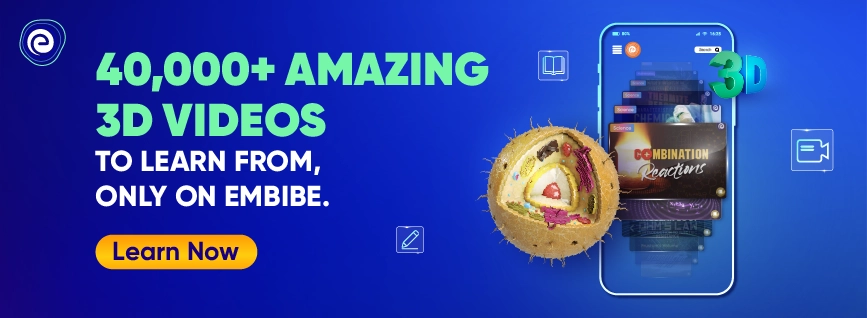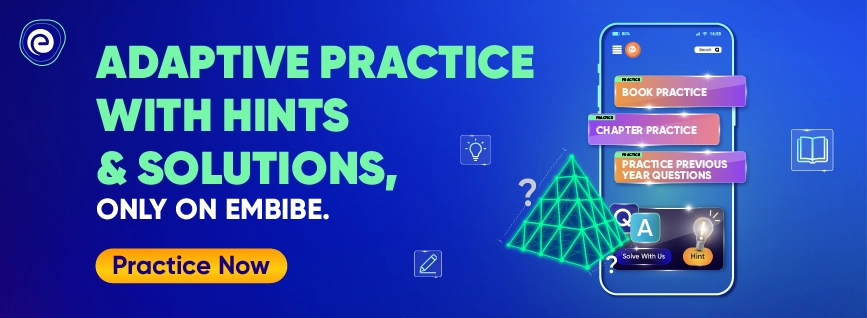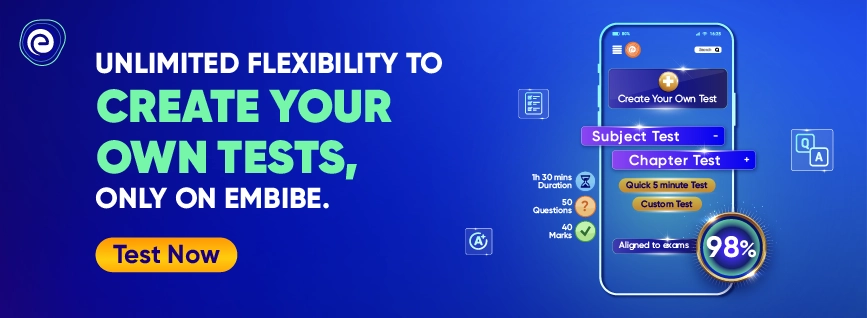- Written by Harshitha A
- Last Modified on 15-02-2023
Himachal Pradesh Board Class 6 Exam 2023
The Himachal Pradesh Board of School Education (HPBoSE) regulates the activities related to imparting education to students across the State. HPBoSE is responsible for administering state-level examinations for classes 1 to 12. It prescribes the syllabus of the exams for Class 6 and publishes the textbooks for classes 1 to 12. The Class 6 exam is conducted by the respective schools and is usually held every year in March, following the Board-prescribed syllabus.
The Board has a committee of skilled subject matter experts to design curricula for various subjects. HPBoSE follows the Continuous and Comprehensive Evaluation (CCE) framework; according to the guidelines, CCE evaluates performance and growth through formative and Summative Assessments (FA) and Summative Assessments (SA). In this article, we have provided Himachal Pradesh Board Class 6 syllabus, exam preparation tips and much more.
Himachal Pradesh Board Class 6 Exam Summary 2023
Every year, more than 5 lakh students appear for the different exams conducted by the HPBoSE. At present, more than 8000 schools are affiliated with the HPBoSE. The HPBoSE-affiliated schools design the class 6 question papers in alignment with the Board’s norms and guidelines.
The Formative and Summative assessment for Class 6 students is based on these subjects:
| Particulars |
Details |
| Board Name |
Himachal Pradesh Board of School Education |
| Short Form |
HPBoSE |
| Exam Frequency |
Annual |
| Subjects |
-Mathematics
-Hindi
-Sanskrit
-Regional Language
-Science
-Social Science
-English |
| Official Website |
hpbose.org |
Himachal Pradesh Board Official Website Link
http://hpbose.org/
Himachal Pradesh Board Class 6 Exam Pattern 2023
Exam Syllabus
The Himachal Pradesh Board Class 6 exam pattern is designed to assess students’ understanding of the core concepts taught in the Class 6 syllabus. The Class 6 exam pattern includes both formative and summative assessments in its marking weightage. Check the detailed exam pattern below:
HPBoSE Class 6 Exam Pattern Details (+/- Marking)
Himachal Pradesh Board class 6 students will have 2 two terms in a year. The weightage for each term is mentioned in the table below:
| Term |
Formative Assessment (FA) |
Summative Assessments (SA) |
Total (%) |
| Term I |
10% |
40% |
50% |
| Term II |
10% |
40% |
50% |
| Total |
20% |
80% |
100% |
HP Board Class 6 Exam Pattern Details: Total Time
In the following table, students can check the details on the HP Board Class 6 exam pattern:
| Type of Assessment |
Duration |
| Formative Assessment |
1.5 Hours or 90 Minutes |
| Summative Assessment |
2.5 Hours or 150 Minutes |
Himachal Pradesh Board Class 6 Exam Syllabus 2023
Students should know their subject-wise syllabus to know what they will be studying during the academic year. Class 6 HPBoSE syllabus includes the most important topics from Science, Social Science and Mathematics. Apart from the main subjects, the syllabus also consists of the first and second (regional) languages per students’ choice.
All the topics in each subject are covered so that students can learn them easily. The subject-wise syllabus for HPBoSE class 6 is given below.
HPBoSE Class 6 Science Syllabus
The HPBoSE Class 6 Science is divided into three sections, i.e. Physics, Chemistry and Biology. Apart from their school textbooks, students can also understand all the chapter topics from the Embibe app. There are 3D videos to explaining the concepts, which make it easier for students to grasp the topics. Students can check the Science syllabus in the following table:
| Chapter Number |
Chapter Name |
| 1 |
Food: Where Does it Come From? |
| 2 |
Components of Food |
| 3 |
Fibre to Fabric |
| 4 |
Sorting Materials into Groups |
| 5 |
Separation of Substances |
| 6 |
Changes Around Us |
| 7 |
Getting to Know Plants |
| 8 |
Body Movements |
| 9 |
The Living Organisms and their Surroundings |
| 10 |
Motion and Measurement of Distances |
| 11 |
Light, Shadows and Reflections |
| 12 |
Electricity and Circuits |
| 13 |
Fun With Magnets |
| 14 |
Water |
| 15 |
Air Around Us |
HPBoSE Class 6 Social Science Syllabus
HPBoSE Class 6 Social Science is classified into History, Geography and Political Science. The basic concepts in all these subjects are different from one another. Check the table below for the complete syllabus:
| Chapter Number |
Chapter Name |
| 1 |
What, Where, How, and When? |
| 2 |
On the trail of the earliest people |
| 3 |
From gathering to growing food |
| 4 |
In the earliest cities |
| 5 |
What books and burials tell us? |
| 6 |
Kingdoms, Kings, and an early republic |
| 7 |
New questions and ideas |
| 8 |
Ashoka the emperor |
| 9 |
Vital Villages, thriving towns |
| 10 |
Traders, Kings, and Pilgrims |
| 11 |
New Empires and Kingdoms |
| 12 |
Buildings, Paintings, and Books |
| 13 |
The Earth in the Solar System |
| 14 |
Globe: Latitudes and Longitudes |
| 15 |
Motions of the Earth |
| 16 |
Maps |
| 17 |
Major Domains of the Earth |
| 18 |
Major Landforms of the Earth |
| 19 |
Our Country- India |
| 20 |
India – Climate, Vegetation, and Wildlife |
| 21 |
Understanding Diversity |
| 22 |
Diversity and Discrimination |
| 23 |
What is Government? |
| 24 |
Key elements of a Democratic Government |
| 25 |
Panchayati Raj |
| 26 |
Rural Administration |
| 27 |
Urban Administration |
| 28 |
Rural Livelihood |
| 29 |
Urban Livelihood |
HPBoSE Class 6 Mathematics Syllabus
Maths is a subject in which students can score full marks. If they understand the topics well and practice sample problems, they can get very good marks in th exam. Students can check the HPBoSE Class 6 Mathematics syllabus in the following table:
| Chapter Number |
Chapter Name |
| 1 |
Knowing Our Numbers |
| 2 |
Whole Numbers |
| 3 |
Playing With Numbers |
| 4 |
Basic Geometrical Ideas |
| 5 |
Understanding Elementary Shapes |
| 6 |
Integers |
| 7 |
Fractions |
| 8 |
Decimals |
| 9 |
Data Handling |
| 10 |
Mensuration |
| 11 |
Algebra |
| 12 |
Ratio and Proportion |
| 13 |
Symmetry |
| 14 |
Practical Geometry |
Students can use the Embibe Big Book for Mathematics for Himachal Pradesh Board Class 6 for their preparation.
Himachal Pradesh Board Class 6 Exam Blueprint 2023
Proper knowledge of the exam pattern, marking scheme, and chapter-wise weightage is important before preparing for the exams. A blueprint is an assessment structure that helps students strategise their studies based on the importance of any chapter or topic in a subject. Check the HPBoSE Class 6 exam blueprint for all the subjects below.
HPBoSE Class 6 Science Blueprint
Students can get clarity on the Himachal Pradesh Board Class 6 Science blueprint from the following table:
| Chapter Name |
Weightage (Marks) |
| Sorting Materials into Groups |
4 |
| Getting to Know plants |
14 |
| The Living Organisms and their Surroundings |
13 |
| Motion and Measurement of Distances |
4 |
| Light, Shadows and Reflections |
10 |
| Electricity and Circuits |
9 |
| Fun With Magnets |
13 |
| Water |
9 |
| Air Around Us |
14 |
| Garbage In, Garbage Out |
7 |
| Separation of Substances |
4 |
HPBoSE Class 6 Social Science Blueprint
In the following table, students can check the Himachal Pradesh Board Class 6 Social Science blueprint:
| Chapter |
Weightage (Marks) |
Chapter |
Weightage (Marks) |
| History |
Geography |
Political Science |
| New Questions and ideas |
1 |
Globe: Latitudes and Longitudes |
4 |
What is Government? |
4 |
| Ashoka the emperor |
6 |
Major Domains of the Earth |
7 |
Panchayati Raj |
1 |
| Vital Villages, thriving towns |
5 |
Major Landforms of the Earth |
5 |
Rural Administration |
5 |
| Traders, Kings, and Pilgrims |
5 |
Our Country- India |
7 |
Urban Administration |
5 |
| New Empires and Kingdoms |
5 |
India- Climate, Vegetation, and Wildlife |
7 |
Rural Livelihood |
5 |
| Buildings, Paintings, and Books |
4 |
|
|
Urban Livelihood |
6 |
HPBoSE Class 6 Mathematics Blueprint
The table below provides an overview of the Himachal Pradesh Board Class 6 Mathematics blueprint. This will help students understand the weightage of different topics and plan their studies accordingly.
| Chapter Name |
Weightage (Marks) |
| Knowing Our Numbers |
12 |
| Whole Numbers |
13 |
| Playing With Numbers |
15 |
| Integers |
9 |
| Fractions |
6 |
| Decimals |
10 |
| Data Handling |
7 |
| Mensuration |
14 |
| Algebra |
6 |
| Ratio and Proportion |
12 |
| Symmetry |
3 |
| Practical Geometry |
10 |
| Basic Geometrical Ideas |
4 |
| Understanding Elementary Shapes |
4 |
HPBoSE Class 6 Practical/Experiments List and Model Writeup
In Himachal Pradesh Class 6 Science, students can do the following practicals/ experiments and models:
| Chapter |
Experiments |
| Food: Where Does it Come From |
A student can perform the experiment involving the germination of seeds such as mung, chickpea etc.;
Preparing a chart on food habits of animals and food culture of different regions of India. |
| Components of Food |
Studying the variety of food in different regions in India.
Preparing a menu of a balanced diet in the context of the diversity of foods eaten in different parts of the country.
Classifying foods according to food components.
Test for starch, sugars, proteins and fats. |
| Fibre to Fabric |
Simple activities can be done to distinguish among different types of cloth.
Field survey for collecting the information on locally available plant fibres (coconut, silk cotton, etc.) |
| Sorting Materials into Groups |
An experiment can be done for grouping things on the basis of gross properties e.g. roughness, lustre, transparency, solubility, sinking/floating using prior knowledge.
Experiments involving heating of air, wax, paper, metal, water to highlight effects like burning, expansion or compression, change of state.
Experiments for testing the solubility of commonly available substances.
Experiments on the effect of heating and cooling on solubility.
Comparison of solubilities of different substances using nonstandard units (eg. spoon, paper cone). |
| Separation of Substances |
Experiments can be performed on sedimentation, filtration.
Separating a mixture of salt and sand. |
| Changes Around Us |
Discussion on other changes which cannot be reversed – growing up, the opening of a bud ripening of fruit, curdling of milk. |
| Getting to Know plants |
Experiment to show conduction by the stem, activity to show anchorage by roots, absorption by roots.
Study of any flower, counting number of parts, names of parts, cutting sections of the ovary to observe ovules. |
| Body Movements |
Activities to study X-rays, find out the direction in which joints bend, feel the ribs, backbone etc.
Observation/ discussion on movement and skeletal system in other animals. |
| The living organisms and their surroundings |
Preparing herbarium specimens of different leaves, plants; studying modifications in plants and animals; observing how different environmental factors (water availability, temperature) affect living organisms; |
| Motion and Measurement of Distances |
Measuring lengths and distances.
Identification and discrimination of various types of motion.
Demonstrating objects having more than one type of movement (screw motion, bicycle wheel, fan, top etc.) |
| Light, Shadows and Reflections |
Experiment to show that some objects (conductors) allow current to flow and others (insulators) do not.
Playing and forming shadows with the hands in sunlight, in candlelight, and in a well-lit region during daytime.
An experiment to make a pinhole camera and observe static and moving objects. |
| Electricity, and Circuits |
Activity using a bulb, cell and key and connecting wire to show the flow of current and identify closed and open circuits. Making a switch. Opening up a dry cell. |
| Fun With Magnets |
Demonstrating how things are attracted by a magnet.
Activity to locate poles of a magnet; activity with iron filings and paper.
Activities with a suspended bar magnet and with the compass needle.
Activities to show that as poles repel and unlike poles attract. |
| Water |
Condensation on the outside of a glass containing cold water; activity of boiling water and condensation of steam on a spoon.
Preparing a simple model of the water cycle.
Estimation of water used by a family in one day, one month, one year. |
| Air Around Us |
Can conduct discussions about different components of air. |
| Garbage In, Garbage Out |
Activity to show that materials rot in soil, this is affected by wrapping in plastics.
Survey of solid waste generation by households.
The estimation of waste accumulated (by a house/ village/colony etc.) in a day, in a year. |
Himachal Pradesh Board Class 6 Study Plan to Maximise Score
As students advance to higher grades, the pressure to perform well in exams also increases. Students need to follow a well-organised study plan to ensure that they can cope with the increased academic pressure.
We have put together a comprehensive study plan to help students be well-prepared for their Himachal Pradesh Board Class 6 exams. We hope this study plan and preparation tips will help students make the most of their studies and maximise their scores in the final exams.
Himachal Pradesh Board Class 6 Preparation Tips
To study the entire syllabus and remember important points, students should know how to study. To help them get good marks in the exam, we have mentioned some tricks to study. Here are some effective preparation tips for HP Board Class 6 students:
- A detailed strategy and a study plan are essential to score better marks in any school examination or competitive test.
- Students must be aware of their academic strengths and weaknesses.
- All students should keep a confident attitude and begin the preparation on time.
- For the chapters that include calculations, students should try to write and practise most of them themselves. For example, some Mathematics chapters can have problems mainly involving calculations. Therefore, they should solve it by themselves without using a calculator. It will increase their calculation speed and accuracy.
- If students get stuck or face difficulties in understanding any concept, they can download Embibe app and start using it to get clarification.
- The golden rule is to distribute the syllabus evenly and study every day regularly. We should keep the days near the exam only for revisions.
- Never shy away from getting the doubts clarified. At Embibe, students can get various preparation resources, tools, and innovative video lectures to learn concepts thoroughly.
- Attempt several mock tests to get accustomed to the exam pattern.
Himachal Pradesh Board Class 6 Detailed Study plan
Below is a detailed study plan students can follow to ensure they can enhance their learning curve to excel in their exams:
- The Himachal Pradesh Board Class 6 Science syllabus has many interesting topics. Students can learn them easily with the help of Embibe 3D videos. They watch how different natural phenomena take place inside and around living beings. Students should also practice drawing neatly labelled diagrams for exam.
- In Himachal Pradesh Board Class 6 Maths, students should understand the topics properly and if they have any doubt, they should get them clarified at the earliest. Once they have learnt a topic of a whole chapter, they should sovle sample questions. It will help them memorise the formulas and solve questions quickly.
- In HPBOSE Class 6 Social Science, students will be studying History, Geography, and Civics. It is a theoretical subject and students need to write to-the-point answers to get good marks. They should try to memorise the dates, event, people involved in the event, cause of the events, etc in History. In Geography, they should memorise important locations for resources, types of land, natural resources, cities, etc. They should also do mapping-practice in Geography.
- For English, students must focus on Improving their reading comprehension skills and vocabulary. They can do this by practising from sample papers or previous years’ papers. Also, they should practise writing clear and well-organised essays to excel in the final exams.
- Embibe has created interesting and creative videos and practice sessions on all the class 6 HPBoSE topics. If you need a better understanding of all the concepts, then it is highly recommended to use Embibe and get the most out of the learning journey.
FAQs on Himachal Pradesh Board Class 6 Exam
Q.1: What is the syllabus of Class 6 HPBoSE?
Ans: The Class 6 syllabus includes the topics from Science (Physics, Chemistry and Biology), Mathematics, Social Science (History, Geography and Political Science) and languages like English, Hindi, and any other regional language the student can select.
Q.2: What are the subjects in HPBoSE Class 6?
Ans: The HPBoSE Class 6 consists of three core subjects: Science, Social Science, and Mathematics and two language subjects, i.e. English and second language, as per the student’s choice.
Q.3: Will the HPBoSE Class 6 students have board exam?
Ans: No, Class 6 exams will be conducted by the school adhering to the guidance of the Himachal Pradesh Board.
Q.4: How to download the latest Class 6 syllabus for the 2023 academic year?
Ans: Students can download the latest Class 6 HPBoSE syllabus on the board’s official website. However, we have provided the complete syllabus in this article as well.
Q.5: Is there any change in the Class 6 syllabus?
Ans: No, there is no official notification regarding the change in Class 6 HPBoSE syllabus yet. However, the Board will notify if any change is planned.
List of Educational Institutions for HPBoSE Class 6
Parents wish to provide the best education for their students. For this, choosing a good school which can ensure the overall growth and development of their children is important. There are many great schools in Himachal Pradesh. At present, more than 8000 schools are affiliated with the HPBoSE Board. Check the table below for the list of schools:
| Sl. No. |
School Name |
Location |
| 1 |
Baddu (Dadhog) – Govt Sr Sec School |
Bilaspur |
| 2 |
Badgaon – S.Bhagat Singh High School |
Bilaspur |
| 3 |
Badgaon – Govt Sr Sec School |
Bilaspur |
| 4 |
Ananehar – Govt High School |
Chamba |
| 5 |
Ather – Govt Sr Sec School |
Chamba |
| 6 |
Aura – Govt Sr Sec School |
Chamba |
| 7 |
Awan – Govt Sr Sec School |
Chamba |
| 8 |
Baat – Govt Sr Sec School |
Chamba |
| 9 |
Badgran – Govt High School |
Chamba |
| 10 |
Badhal Thore – D.A.V.M. Public School |
Kangra |
| 11 |
Reckong Peo – Little Angels Public School |
Kinnaur |
| 12 |
Bhekhali – Great Himalyan Public School |
Kullu |
| 13 |
Banjar – D.A.V. Public School |
Kullu |
| 14 |
Naggar – Grooms Public School |
Kullu |
| 15 |
Siun Ladbharol – Pinegrove International Public School |
Mandi |
| 16 |
Koon – Deep Jyoti Adarsh Public School |
Mandi |
| 17 |
Nerchowk – Abhilashi Model Sr.Sec.School |
Mandi |
| 18 |
Padhar – Shikshavid School |
Mandi |
| 19 |
Deha(Balson) – Sarswati Vidya Mandir School |
Shimla |
| 20 |
Sanarsa – Vijay Public School |
Shimla |
For a complete list of schools with contact information, check here.
List of Future Exams After Himachal Pradesh Board Class 6
Besides the school-level exam, many National and International competitive examinations are held annually. These tests boost students’ confidence and enthusiasm in subjects.
Some of the competitive exams for which grade 6 students can appear are:
- Class 6 International Science Olympiad (ISO)
- Class 6 International Maths Olympiad (IMO)
- Class 6 English International Olympiad (EIO)
- Class 6 General Knowledge International Olympiad (GKIO)
- Class 6 International Computer Olympiad (ICO)
- Class 6 International Drawing Olympiad (IDO)
- Class 6 National Essay Olympiad (NESO)
- Class 6 National Social Studies Olympiad (NSSO)
- National Talent Search Examination (NTSE)
- National Level Science Talent Search Exam (NLSTSE)
- Indian National Olympiad (INO)
- Science Olympiad Foundation
- GeoGenius
- Silverzone Olympiads
- National Interactive Maths Olympiad (NIMO)
- National Biotechnology Olympiad (NBO)
- Asset (Assessment of Scholastic Skills Through Educational Testing)

















































